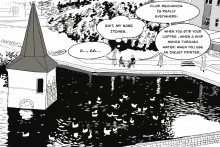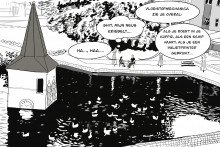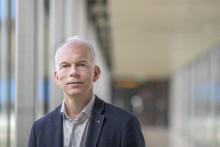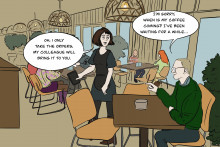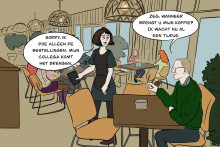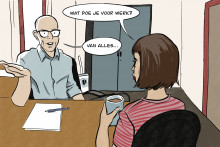Can he stir his coffee without thinking about his work? Dominik Krug, a researcher of Physics of Fluids at the University of Twente, laughs when hearing the question. ‘I don’t actually put milk in my coffee, but I tend to think about those things, yes. Fluid mechanics are all around us. Not only when you stir your coffee, but also when you’re talking about the current around a moving object, such as a ship or a car. Our group is in fact engaged in a large research project in inkjet printing. Drops of ink are sprayed onto the paper at high pressure and speed. When they land on the paper, you don’t want them to splatter.’
As a teenager, the German wanted to become a pilot, but that passion dampened once he was able to fly a glider himself. It made him nauseous and it wasn’t that intellectually challenging either. Krug therefore shifted his attention to why an aircraft can take off, i.e. aerodynamics, and, with a detour, ultimately ended up at the Twente group Physics of Fluids.
He’s currently researching how solid particles and air bubbles move and collide in a swirling liquid. In the mining industry, for example, these bubbles are used to separate valuable minerals from the other rock. The pulverised rock enters a water tank, through which air bubbles float as well. The water is stirred well, causing the minerals, rock particles and the bubbles to collide. The bubbles with the hydrophobic minerals surface, whereas the rock particles eventually sink.
‘It’s a very selective separation process and it happens on a large scale, about two billion tons per year,’ Krug explains. However, predicting how often and how fast the particles will collide is difficult. This has to do with turbulence, which affects how bubbles and other particles move in relation to each other and to the flowing water. Krug examines the extent and the conditions in which the bubbles and particles collide. ‘Because this separation method is applied on such a large scale, even minor improvements have a major impact.’

He doesn’t always succeed in transferring his enthusiasm for the subject to his discussion partners in the pub, he says. ‘I always have to explain what fluid mechanics is first and not long thereafter, I reach the part where people no longer understand the subject matter or have lost interest. Particularly people who weren’t that interested in physics in secondary school think it’s all a bit geeky. ‘I’m often also asked questions such as ‘what do we need that for?’. We conduct fundamental research to gain more knowledge about real problems, but do not necessarily provide a turnkey design solution.’
As far as he is concerned, the latter isn’t always necessary anyway. ‘There doesn’t always have to be a direct application, it’s also interesting to look at something from a scientific perspective. There are many examples in history where something was developed that seemed very fundamental at the time, whereas the actual application only came much later. Sometimes, you have to work in an exploratory way, that’s what universities are for.’
Fluid mechanics also play a major role in the transmission of the coronavirus: you’ve got aerosols, respiratory emissions, turbulence and the way droplets float in the air and evaporate. This was once a niche project that very few researchers were interested in. Suddenly, it has become very relevant. A lot of people are now digging up those old papers and a lot of new studies are being conducted as we speak. Suddenly, it has become important.’
Nevertheless, he can sometimes be jealous of his brother, who is a doctor. ‘Everyone gets ill every now and then, so that field is very close to what people experience in their daily lives. Everyone can participate in the conversation. When I explain something, I’m always the only one talking.’



